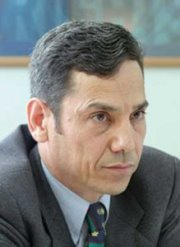 “My father was a human rights activist whose rights have been violated in Iran and is now forced into imprisonment. But despite all the lawlessness about my father, he is now a prisoner and according to the country’s laws, a prisoner is entitled to furlough, and he has been deprived of this right,” Abdolfattah Soltani’s daughter told the International Campaign for Human Rights in Iran. “My father was a human rights activist whose rights have been violated in Iran and is now forced into imprisonment. But despite all the lawlessness about my father, he is now a prisoner and according to the country’s laws, a prisoner is entitled to furlough, and he has been deprived of this right,” Abdolfattah Soltani’s daughter told the International Campaign for Human Rights in Iran.
|
 The Wrong Decision for Human Rights The Wrong Decision for Human Rights
Yesterday the Supreme Court ruled in Kiobel v. Royal Dutch Petroleum (Shell) that Esther Kiobel may not proceed in her case against Shell for aiding and abetting in the torture and murder of her husband. In addition to setting back Esther's quest for justice, the Court's decision has two major effects: It limits accountability for gross human rights abuse committed abroad and it gives foreign corporations preferential treatment over domestic businesses.
In 1995, Dr. Barinem Kiobel was kidnapped, tortured, and executed by hanging following a trial before a military tribunal that was internationally denounced and widely condemned as a sham along with eight other people. Dr. Kiobel was a leader of a non-violent organization that protested Shell's polluting of the land in the Ogoni region of Nigeria. To quash the protest, Shell allegedly sent corporate officers to meet with the Nigerian government and provided funding and training to the Nigerian military for "security operations" that resulted in years of violent abuse, including harassment, beatings, rape, torture and ultimately death.
Dr. Kiobel's wife, Esther, fled to the United States and eventually brought her lawsuit against Shell under the Alien Tort Statute (ATS). The ATS has been one of the foremost tools for lawyers representing foreign victims of torture, extrajudicial killing, genocide, crimes against humanity, and war crimes. The Act was passed by the first Congress, and until today, allowed foreign citizens to seek justice for human rights abuses U.S. federal court. But the Supreme Court has limited this foundational principle. The Court's decision in Kiobel v. Royal Dutch Petroleum (Shell) is deeply damaging for victims of human rights abuse and for the principles of this country as well.
Today's decision leaves Esther Kiobel and plaintiffs like her with little recourse against some of the largest corporations in the world. The judicial system in Nigeria, where Esther's husband was tortured and murdered, is notoriously corrupt, making it virtually impossible for Esther Kiobel to receive anything approaching a fair hearing in that country. Shell is a major economic presence in the country, and maintains ongoing connections to government officials, particularly the military, which it coordinates with on "security" matters in the areas where it operates. This symbiotic relationship not only drove the abuses, it now effectively insulates the company from justice.
Unfortunately, Esther's is hardly an isolated case. Mutually beneficial arrangements between corrupt local officials and corporate officers hoping to benefit from lax environmental and labor protections foster a climate of impunity across the globe. The ATS enabled victims like Esther to challenge abuses in a neutral forum.
Numerous existing human rights cases against individuals, groups, and corporations for abuses abroad are now in question. In its decision, the Court failed to give clarity to when and under what circumstances the ATS does apply to human rights abuse. More litigation will surely arise from this decision as human rights advocates attempt to determine its limits.
In addition, the decision effectively gives preferential treatment to foreign corporations over domestic businesses in United States Court. The Court ruled that Shell could not be sued in this case under the Alien Tort Statute because "mere corporate presence" in the United States is not enough. Now, companies like Shell that are headquartered elsewhere but do business in the United States do not have to worry about being sued here by virtue of their activity within our borders.
With the United States' reputation as a human rights leader now in doubt, the question on everyone's mind is how Congress will respond. In delivering its decision, the Supreme Court suggested that Congress can act to ensure that victims like Esther have access to U.S. courts in cases like this one. We expect that Congress will do so without delay.
(2013-04-19/huffingtonpost)
|





 “My father was a human rights activist whose rights have been violated in Iran and is now forced into imprisonment. But despite all the lawlessness about my father, he is now a prisoner and according to the country’s laws, a prisoner is entitled to furlough, and he has been deprived of this right,” Abdolfattah Soltani’s daughter told the International Campaign for Human Rights in Iran.
“My father was a human rights activist whose rights have been violated in Iran and is now forced into imprisonment. But despite all the lawlessness about my father, he is now a prisoner and according to the country’s laws, a prisoner is entitled to furlough, and he has been deprived of this right,” Abdolfattah Soltani’s daughter told the International Campaign for Human Rights in Iran.